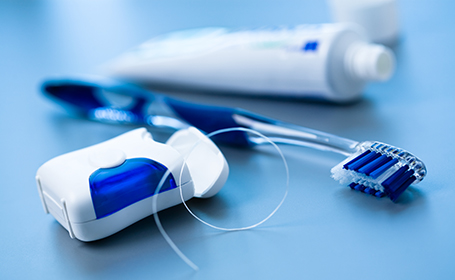
How to maintain good oral health
We give you the lowdown on gum disease and oral hygiene and share 5 expert tips to help protect and maintain your oral health
What is gum disease?
Gum disease is one of the most common side effects of not maintaining your oral health. If left untreated, gum disease can cause tooth loss.
Gingivitis is the earliest and mildest form of gum disease. It causes redness, swelling and bleeding. If you have gingivitis – don’t panic. It is common and usually reversible with proper oral hygiene and professional cleanings.
But, if left untreated, this form of gum disease can progress into periodontitis, which is a more severe form of gum disease. Periodontitis involves the loss of the bone and connective tissue that hold your teeth in place. Symptoms include deep pockets between your teeth and gums, gum recession, tooth sensitivity, and tooth movement.
These symptoms might seem daunting, but the good news is that with a combination of daily care and regular check-ups at the dentist, you can keep your smile in top condition.
If your gums do hurt or bleed during brushing or flossing, or if bad breath is a persistent problem, then you should arrange an appointment to see your dentist.
What is good oral hygiene?
Maintaining good oral hygiene is not just about your teeth. It’s about making sure your whole mouth is healthy. As a general rule, if your mouth looks and smells healthy then it probably is. You can check whether your mouth is healthy by going through this checklist:
- Are your teeth clean and clear of debris, plaque and stains?
- Are you free from toothache?
- Are your gums their normal colour and free from pain and bleeding when you brush your teeth or floss?
If your gums do hurt or bleed during brushing or flossing, or if bad breath is a persistent problem, then you should arrange an appointment to see your dentist. It is important to note that everyone gets bad breath from time to time, especially after a fragrant meal or first thing in the morning. But if you have persistently bad breath that does not go away after brushing your teeth or using mouthwash, then you might be suffering from underlying gum disease.
In most cases, your dentist will be able to treat the issue (you might need fillings or a scale and polish to remove a plaque buildup). However, some conditions and diseases require more specialist treatment such as oral or maxillofacial surgery.

Tips for maintaining good oral hygiene
Although severe gum disease can cause changes to the appearance of your smile, tooth loss, and the spread of infection, you can absolutely prevent it from getting to this stage. So, don’t worry, simply follow our five top tips to maintain your oral health and avoid gum disease.
1. Clean your teeth
Keep your teeth clean by brushing them twice a day with fluoride toothpaste. This removes food debris and plaque which builds up on your teeth when you eat and drink. Dental plaque is a soft, sticky film of bacteria that forms on your teeth and gums. It can lead to tooth decay and gum disease if not regularly removed through brushing and flossing.
You should brush your teeth for at least two minutes at a time, making sure you reach every surface of your teeth. It doesn’t matter whether you use a manual or an electric toothbrush, as long as you clean each tooth thoroughly.
The best time to brush your teeth is last thing at night just before you go to bed, and one other time during the day. Try not to clean your teeth within an hour of eating or drinking, because the enamel is softer at these times and you could damage it.
Rinsing your mouth with fluoride mouthwash can help to prevent tooth decay, but don't use it straight after brushing your teeth as this can wash away the concentrated fluoride in the toothpaste left on your teeth.
2. Floss between your teeth
Once a day you should clean between your teeth with floss and/or interdental brushes to remove any food debris and plaque. If plaque builds up between your teeth it can irritate your gums and cause inflammation. Flossing also helps remove food particles and bacteria that can contribute to bad breath.
It’s important to floss to reduce your risk of gum disease and keep your overall oral health fresh. However, flossing incorrectly can also cause damage to your gums, so you should follow your dentist’s advice about how to do it correctly.
3. Eat a healthy diet
Eating well is best for your mouth and good for your overall health. Sticking to food and drinks that are low in sugar helps to prevent tooth decay.
Be careful of ‘healthy’ options such as fruit juices and smoothies, which actually contain lots of sugar and can damage your teeth. A diet rich in vitamins and minerals can also help prevent gum disease.
It’s good to limit your consumption of sugary food and drinks to mealtimes and avoid snacking, limiting the time your teeth are exposed sugar.
Finishing meals with a cube of cheese is a great way reduce the acidity in your mouth, which can damage your teeth. You can also protect your teeth and gums between meals by chewing sugar-free gum containing xylitol.
Alcohol can also erode the hard enamel that protects your teeth, and smoking can stain your teeth and increase the risk of gum disease.
4. Avoid smoking and heavy drinking
Drinking too much alcohol and smoking are very bad for your oral health and are two of the biggest risk factors for mouth cancer. In fact, people who smoke and drink heavily are up to 38 times more likely to develop the disease than people who don’t drink or smoke.
Smoking can also affect the aesthetic of your smile. According to the Oral Health Foundation, smoking can make your teeth yellow in a very short time, with heavy smokers complaining that their teeth are almost brown after years of smoking.
Alcohol can also erode the hard enamel that protects your teeth, and smoking can stain your teeth and increase the risk of gum disease.
5. Go for regular check-ups
See your dentist regularly and don’t put off going for check-ups. Your dentist can advise you on how best to take care of your mouth. Detecting any possible problems early can mean they’re easier to treat. Your dentist will also check your mouth for signs of mouth cancer, which is more treatable if it’s caught early.
Get help with Circle Health Group
At Circle Health Group we offer a range of treatment options, including oral and maxillofacial surgery, for more complex oral problems.
If you want to know more about our treatment options, book your appointment online today or call a member of our team directly.
Tags
How do I book an appointment?
If you're concerned about symptoms you're experiencing or require further information on this subject, talk to a GP or see an expert consultant at your local Circle Hospital.